Paul Stephenson's Blog, page 7
May 13, 2019
Back to Discovery Park

As I contemplated the third anniversary of my becoming a published man of letters, there was one thing that stuck out as being ‘not quite right’ amongst my back catalogue. A black sheep, you might say. Welcome to Discovery Park, the years-long chronicle of my idiotic attempt to listen to every single album on Rolling Stone Magazine’s top 500 albums of all-time list. It was an endeavour started for the sadly-defunct masterpiece of musical criticism that was the Demon Pigeon website, then continued when there really was no point in doing so beyond my own endless obsession and completist’s brain.
It’s not a black sheep because I’m ashamed of it, far from it. I am stupidly proud of some of the writing in it. I think it’s really funny and insightful and a bit brilliant, much like my Mum always thought I was the most handsome boy in school.
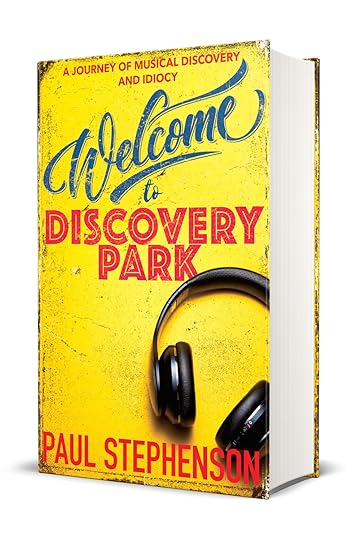
No, the black sheep element came from the cover. It’s had two covers so far, both exceedingly dull affairs. The first looked like a child’s GCSE mock-up of a magazine cover, the second looked for all the world like a textbook on managing the macroeconomics of responses to malaria outbreaks amongst middle-income voters, or something equally as tedious.
So, to celebrate the three year anniversary of my author career, I’ve given the cover a makeover, a new lick of paint, a fresh pair of lace panties, for no other reason than I’d like it to have the cover it deserves.
Look how lovely it looks! The book itself remains the same – still the same silly, idiotic, enormously fun jaunt through some of the best records of all time, and some of the most overrated. It looks at why we feel the need to quantify and rank art, revels in the complex musical world we live in, and wonders why anyone would voluntarily listen to Bono (with apologies to anyone who does). If you’ve yet to give it a read, I highly encourage you to check it out. It’ll cost you less than a Big Mac and will be endlessly more satisfying.
Check it out now
Paul Stephenson is a writer of horror and science fiction novels. Blood on the Motorway: An apocalyptic trilogy of murder and stale sandwiches is out now in ebook and print from Amazon and all other good bookstores. You can get the first book free by joining the mailing list or reading along at Wattpad. Oh, and he’s got a Patreon. Sign up for free books, a free weekly short story, and much more.
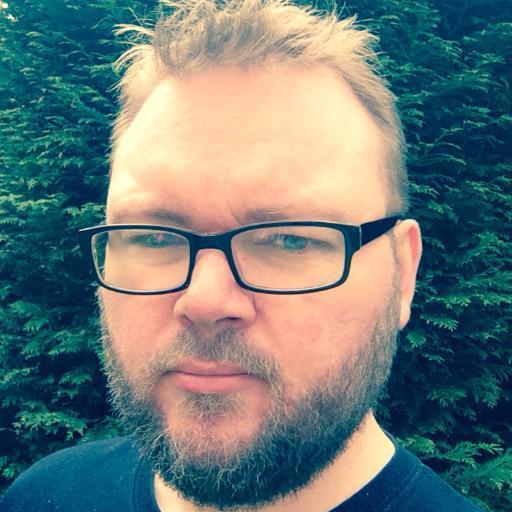
May 8, 2019
The Power of Threes
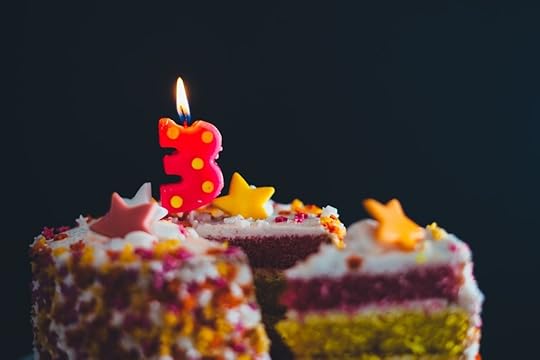
Photo by Annie Spratt on Unsplash
I’ve hit a couple of milestones in my indie author career in the last few weeks. Firstly, Blood on the Motorway, my first novel, is three years old. Well, it’s a lot older than that if you include its protracted initial pregnancy, but that’s how long it’s been since I launched it as a debut author. In the three years since it’s been joined by its sequels – Sleepwalk City and A Final Storm, as well as my non-fiction musical misadventure book, Welcome to Discovery Park.
As I’ve rounded the corner on this milestone, I’ve hit another one. In three years, with these four books, I’ve hit a grand total of 3000 sales. 3000! Not JK Rowling territory, perhaps, and certainly not enough yet that I can cash in my day job and lay spread-eagled on a mattress made of money – but it’s significant, mostly because I can conclusively say at this point that it’s not just people who have met me or are blood related who are buying my books.
In the first year, sales topped off at less than two hundred, then gathered pace in 2017 and levelled off to a more consistent level in the last year and a half. This is, it has to be said, hugely gratifying. A huge chunk of people who’ve read the first book have gone on to read the second and third, or picked up the complete trilogy version. The reviews have been overwhelmingly positive (save for the odd one moaning about my feelings about Trump or saying they loved the book and then awarding it one star) and I’ve had some lovely emails from readers and more than a few requests to write more stories in the world of Burnett, Tom, Jen, et al.
If these first three years have been a success, however, they’re nothing compared to what I have planned for the next three. Looking ahead to May 2022, if I write another catch up then I should have released the first four novels in the Sunset Chronicles, the first three novels in another brand new series (top secret for now, although if you follow me on Instagram you may well be able to gather the subject matter), and three collections of short stories. By my mark that will take my total book tally from four to fourteen. Suffice to say, I’m ramping things up a bit.
For now, though, I just want to say a huge thank you to every single person who’s bought one of my books, an even huger thank you to anyone who’s left a review, sent me an email, joined the mailing list, or bought one of my shiny pieces of merchandise. You are all magical people. Not one of those people yet? Well, what are you waiting for?
Paul Stephenson is a writer of horror and science fiction novels. Blood on the Motorway: An apocalyptic trilogy of murder and stale sandwiches is out now in ebook and print from Amazon and all other good bookstores. You can get the first book free by joining the mailing list or reading along at Wattpad. Oh, and he’s got a Patreon. Sign up for free books, a free weekly short story, and much more.
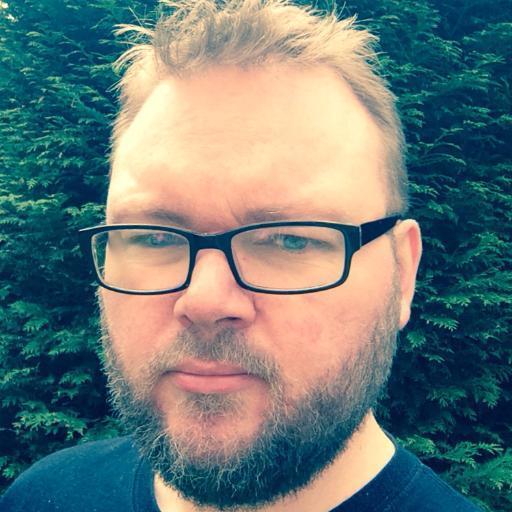
April 29, 2019
Writing: Expectations vs Reality

Photo by Kelly Sikkema on Unsplash
When I made the decision to make ‘writing’ my vocation, I believe I was sold a bill of goods. I want to return it. Sadly, it is now too late for me, as evidenced by the fact that my first instinct when returning from a well-earned two weeks off was to open my laptop and start tapping away at those idiotic squares on my keyboard. I am doomed. But over the course of the several decades of this ridiculous ‘calling’, I think the scales have fallen from my eyes about the whole damn endeavour. I know the truth, and the truth is that this writing life is nothing like the brochures. Let’s take a look at some of the realities vs the expectations I had going in.
Expectation: The writer’s life.Ever since I wrote my first short story, I’ve dreamed of a final end goal where I could live the authorial life promised me by just about every single film about an author I’ve ever seen (apart from those Stephen King ones about authors being haunted, murdered, hobbled, or freezing to death in a maze). To whit, one where I wake up each morning and saunter into my oak panelled study to whip off the next bestseller, enjoy a glass of red wine and relax, possibly with a dog at my feet and a polo neck on my slim frame.
Reality: My current writing setup is to write on the kitchen table, in the passenger seat of my car, on my knees in the bedroom, or pretty much anywhere I can, while desperately trying to block out the sounds of real life occurring all around me. In any given writing session, I spend as much time being frustrated by lost trains of thought as I do my own inability to stay off Twitter long enough to do any actual writing. Oh, and I hate both red wine and polo necks. There is no oak panelling to speak of.
Expectation: Writing is about writing.The job of a writer is to write, right? To craft worlds, weave characters, toy with the emotions of their readers, and generally utilise the alchemy of brainwaves to make magical new realities?
Reality: As an indie author, I reckon less than half my ‘writing’ time is spent actually writing. There’s marketing, cover design, social media, project planning, business admin, watching endless webinars about reader engagement and any other million things that go toward trying to run a small business that happens to sell books. If anyone out there is of the opinion that writing books is easy living, I want to punch them quite hard in the face. Even when it comes to the writing itself, aside from the first draft, there’s very little of writing that actually resembles that magic that sustains us, drives us forward. Editing your manuscript, for example, makes pulling out and re-growing your fingernails and pulling them out again seem like a fun hobby.
Expectation: Writing is fun!Writing is more than a hobby, it’s a calling, something, in my case at least, that draws me back like someone doing a bad impression of Al Pacino in Godfather III. One would think, then, that it’s a pastime that one actually enjoys doing, right?
Reality: Writing is many things – revelatory, magical, tiring, boring, roughly akin to self-dentistry – but one thing I’ve not really experienced much from it is a sense of joyful fun and abandon. Even when I get into that rare and magical ‘zone’ where the words are flowing from my brain and through my fingertips at an alarming rate, when my characters seemed to be creatures of their own creation, doing things I’d never have dreamed of getting them to do – it’s a gruelling and tedious slog. And yet… and yet… it’s still utterly revelatory, magical… as well as tiring, boring, and roughly akin to self-dentistry.
Expectation: The boozy geniusA particularly toxic one, this. A hoary old trope that seemingly gets reinforced from every angle, I was raised thinking of writers like Hemmingway, Hunter S Thompson, Stephen King, Bukowski, Kerouac. Hell, when I first started writing I was really into Withnail and I and remember a documentary about its writer, Brice Robinson, in which he was soused the whole time he wrote it.
Reality: I don’t doubt that many of these bewildering geniuses wrote most of their work half cut, but honestly, I cannot write drunk. Not even remotely. The other day I thought I’d enjoy a nice beer while trying to hit my daily word count, and halfway through a single can of IPA I realised I was writing utter garbage. Now, you can take this as further irrefutable proof, if proof be needed, that I am not one of those merry geniuses, but I prefer to think that this is just one of those nonsense macho tropes to make us all seem cool when we’re just nerds hunched over our keyboards.
Expectation: The instant successAnother one conditioned into me by those aforementioned movies about writers. After all, who ever made a movie about a writer getting endlessly knocked back and failing to get anywhere? But part of me thought that there was a standard route – write a book, have some character-building knockbacks and then instantly find fame, fortune, and the ability to lead the writer life outlined in the previous four points.
Reality: In 2019, this is absolutely not how it works. The vast majority of traditionally published authors earn less from their work than a minimum wage job, and self-published authors like myself consign themselves to a gruelling treadmill of promotion, entrepreneurial slog, and the potential for the whole thing to collapse like a flan in an oven at any time.
So what are the lessons from all this? It’s a hard slog, being an author, and most of us have to do it on top of all the real-life stuff that other people will insist on you having to do. But is it worth it? I honestly can’t answer that, but I can tell you that I’m in. I’m hooked. There ain’t no escape from this monkey on my back, and the bastard’s holding a typewriter.
So, fellow writers, what am I missing. What writer realities confound the expectations you had going in?
Paul Stephenson is a writer of horror and science fiction novels. Blood on the Motorway: An apocalyptic trilogy of murder and stale sandwiches is out now in ebook and print from Amazon and all other good bookstores. You can get the first book free by joining the mailing list or reading along at Wattpad. Oh, and he’s got a Patreon. Sign up for free books, a free weekly short story, and much more.
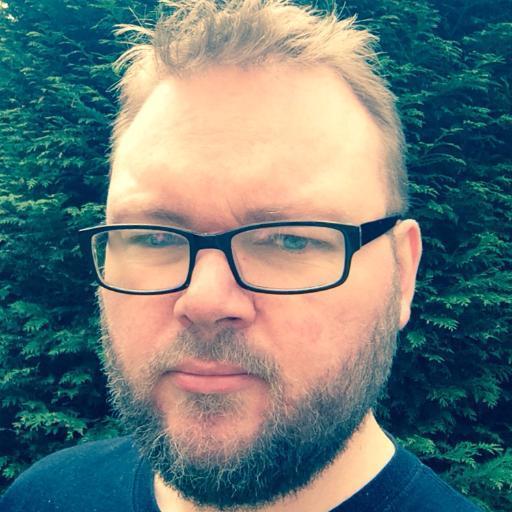
April 23, 2019
Paris, Je t'aime
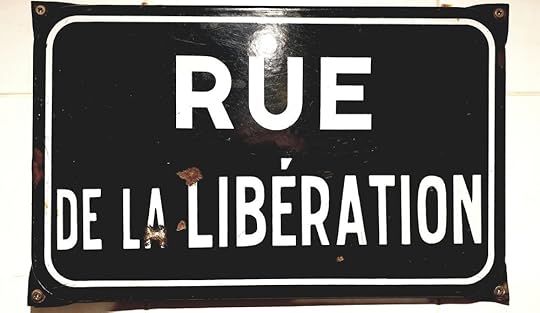
I’ve just returned from the most beautiful place I’ve ever been to, and I am, quite frankly, floating on air. Little place called Paris. Maybe you’ve heard of it.
Maybe it’s the swell of European pride of the staunch anti-Brexiter living in my blackened little heart. Maybe it’s the lure of the air of culture and creativity that seems to pour out from the very foundations of the city. Maybe it’s the faintly revolutionary fervour seeped into every statue and grand building. Or maybe it’s just that the place is insanely and preposterously beautiful. I mean, I knew it would be, but the sheer scale of wondrous beauty did take me back a bit.
I spent five days wandering open-mouthed around its splendour, following on from five days wandering about Disneyland with much the same level of awe. Yes, I know it’s all very crass and commercial and not meant to be enjoyed by sensible people with sensible taste, but I got on stage with Groot and engaged in a level of Dad Dancing unparalleled in Western Society and made my family look like they might expire from laughter. So stick that up your pipe.
Probably my highlight of the whole trip was going up to Montmartre, the artistic district, where the painters and writers sit resplendently in the Paris sunshine, creating away in the same chairs that once held the posteriors of the likes of Picasso and van Gogh. Well, they’ve probably changed the chairs since then, but you get the drift. I almost wished I had my laptop with me so that I could get on with some hard-core Parisian creation, but then I remembered I was on holiday and came to my senses.
Anyway, Paris, je t’aime. You magnificent bloody city, you.
Paul Stephenson is a writer of horror and science fiction novels. Blood on the Motorway: An apocalyptic trilogy of murder and stale sandwiches is out now in ebook and print from Amazon and all other good bookstores. You can get the first book free by joining the mailing list or reading along at Wattpad. Oh, and he’s got a Patreon. Sign up for free books, a free weekly short story, and much more.
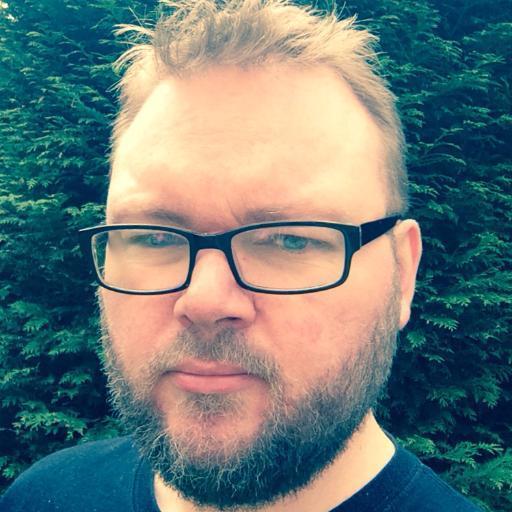
April 15, 2019
10 ways to sabotage your own Science Fiction novel

Photo by nikko macaspac on Unsplash
Over the years, I’ve turned my hand to Science Fiction a number of times, with mixed results. I’ve written some stuff that seems pretty decent, and I’ve written a whole lot of turgidly dreadful nonsense. It is, then, something of a miracle to me that I have written a whole 120,000 word science fiction novel, let alone that it is going to be book one in a series (coming in August, fact fans). But littered throughout the dusty folder where failed stories go to die are an alarming amount of stories that never quite took off. I’ve been looking back over some of them and trying to work out why, and I’ve come up with 5 ways that any writer can sabotage their own Science Fiction novel.
A situation is not enough. Sure, you can start a story with a young buck pilot in their spacecraft about to go to battle, describing every detail around them in miniscule detail. But it’s probably a good idea to work out what they’re doing in that spacecraft to begin with, and why the reader should care.
Be careful of your world building. If you go and make an offhand comment about a new piece of tech, you now have to use that tech throughout the entire rest of the story. Not so much of a problem when you’re describing a new way of watching television, perhaps, but decidedly more difficult if you replace the entire transportation system with solar-powered unicorn rides.
Consider your present. My books are set one hundred years from now, so every time you have some globally epoch-shaking news event, I have to retcon my entire future history. I’m almost certain that on the day I finally release the damn thing, someone’s going to do something that invalidates all my suppositions. I’m also fairly sure that while everyone’s running around with their hair on fire and pants full of bees, I’ll be hunched over my laptop wondering how it’s going to impact chapter three of the fourth part of book two.
Stop bringing your prejudices to the page. Listen, whether you’re writing fantasy or sci-fi, stop it with the endless white saviour tropes, or the backwards society endlessly marrying off young girls to old men. Or having every race of people from south of your strangely ethno-bland main race be slave-trading people with olive skin. This especially goes for when you discovered strange new worlds and new civilisations. It’s amazing how many of those seem to have the same skewed attitudes about gender and race. We all see you, we know what it says about you, and it says you’re an asshat.
It’s all about the characters, baby. There’s been some dreadful sci-fi recently, particularly in film and tv. Sure, for every Prometheus there’s an Arrival, for every Lost in Space reboot there’s an Ex Machina, but there’s a common thread amongst the terrible ones – it’s all about the characters. They’re bland, cardboard cutouts there to service a plot that’s in turn there to service the visuals. Now don’t get me wrong, there’s nothing wrong with nice visuals, but the relationship is all skewed. It should go the other way round, from visuals to plot to character. Horror is in a real resurgence at the moment because there’s a lot of great films that have their characters at the core of the film, and a lot of the sci-fi I’ve watched and read of late seems to have forgotten that.
There you go. Ignore these five pitfalls and you’ll have a bona fide hit. At least, that’s what I’m hoping. I’m also hoping that I’ve avoided these pitfalls, because if I haven’t, well then sheesh, that’d be kind of embarrassing.
Blood on the Motorway: An apocalyptic trilogy of murder and stale sandwiches is out now in ebook and print from Amazon and all other good bookstores. You can get the first book free by joining my mailing list or read along at Wattpad. Oh, and I’ve got a Patreon. Sign up for free books, a free weekly short story, and much more.
April 8, 2019
What will publishing look like in 10 years?
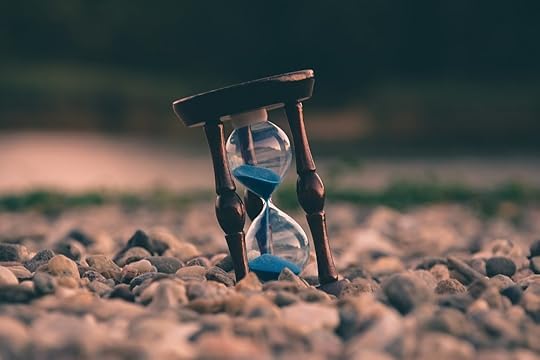
Photo by Aron Visuals on Unsplash
Part of the fun of writing a dystopian science fiction series (Sunset Chronicles, coming soon — join my mailing list to keep informed) is trying to play futurist, casting yourself as some kind of wise sage of humanity’s future. You know, instead of as a middle aged man sat at a kitchen table hunched over a laptop. While I’m doing this my self-image morphs into Johnny Lee Miller in Hackers, surrounded by code and cool music while Angelina Jolie pouts somewhere in the corner.
One thing I don’t get to look at much is what’s going to happen to the wonderful world of books. You don’t tend to get much sitting around and reading books inside of a book, although I’m sure there’s a few exceptions to that, before you go all keyboard warrior at me. So, since I’m also a total nerd about indie publishing and the future of this wonderful world of books, I got to wondering – what will the world of book publishing look like in ten years? What? I’m not procrastinating, you’re procrastinating.
Broadly speaking, I reckon it’s going to go one of three ways.
Way No 1. Since we’re talking ten years, let’s look back ten years ago and try and extrapolate forward. 2009. Well, Indie publishing wasn’t really a thing, audiobooks only came on cd or tape, dinosaurs still roamed freely across the planet, and nobody knew what the hell a Jackfruit was. So if we take that as a curve line, we can extrapolate that in ten years everyone will have all of their entertainment beamed directly into their retinas, books will be downloaded into your heads within seconds like when Neo learns Kung Fu in The Matrix, and we will be surrounded by jackfruits, which will have become the sole and singular foodstuff of the human race.
Way No 2. If Way No 1 looks on a fixed timeline of progress, Way No 2 operates on the alternative axis. Given the absolute clusterfudge humanity is making of the challenge of climate change – preferring to whittle its last decade of potential solution voting endlessly on Brexit and electing despots who use language that would make Joseph Goebbels say ‘steady on there, mate’ – the only chance we might have to read books in ten years is when we’re sitting on stacks of them in abandoned libraries, huddled over burning piles of said literature as we warm our hands against perpetual winter. Wait, no, that’s the plot of The Day After Tomorrow, isn’t it?
Okay, well how about this: We will be buried under avalanches of AI-generated content, produced at such rates as to ensure the only ones who can keep up will be other AI. Sentient programmes will roam the streets, loudly declaring to each other the virtues of the seventy millionth volume of the book of 0010101101, as we mortals cower in fear at having to hear another seventeen hour piece of exposition, gnawing on unripened jackfruits as tears stream down our soot-blackened faces.
Way No 3. We are ten years in the future. People still read books, and people still write books. Some people consume them in paper, some digitally. Some publish their own work, and some publish through others. People are still elitist snobs, and some are still fanatical about work that has no claim over such rabid devotion. Films are still made of books. Books are still made of films. There may be new ways to consume entertainment, and some people will decry these as the death of the written word. The written word will continue, and people will continue to enjoy the written word. There will still be bloody jackfruits everywhere, though. I tell you now, those things are going to be EVERYWHERE.
Blood on the Motorway: An apocalyptic trilogy of murder and stale sandwiches is out now in ebook and print from Amazon and all other good bookstores. You can get the first book free by joining my mailing list or read along at Wattpad. Oh, and I’ve got a Patreon. Sign up for free books, a free weekly short story, and much more.
April 1, 2019
Enjoy 60+ thrilling reads for free
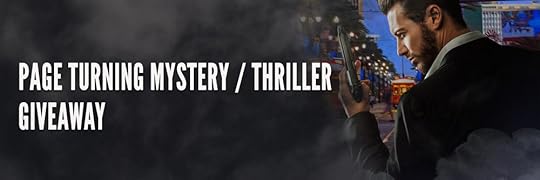
Genre is a funny old thing. Not funny ha ha, perhaps, but bear with me. As writers, especially in the fickle world of self-publishing, we are expected to stick rigidly to one niche for the whole of our careers. It’s very weird. I can’t really think of any other artistic medium where this is true. Over the course of twelve albums The Beatles covered so much ground they had to invent new ground for them to fit. Steven Soderbergh changes genre with every single film, taking his voice and applying it to a radically different canvas. Hell, even painters have ‘periods’ wherein they’re expected to radically develop their style.
Not so for the lowly author. So much of modern publishing advice boils down to ‘find your niche, settle down into it, and take it as far as you can.’ You can’t go from, say, historical fiction to military space opera. And if you do, you’d damn well better crack open a new pen name on every occasion. ‘Readers are genre loyal’ they say.
This seems weird to me, not just because I read across a wide range of genres myself (as do most people I know) but because I struggle with where every single damn one of my own books should sit. The Blood on the Motorway series, for example, is definitely Post-Apocalyptic. Rootin, tootin, end of the world stuff. That is the setting, the overriding trope that governs everything within it. But beyond that? Well, it definitely has elements of horror in there, not least in the murderous psychotics the storm sees fit to spare. Then there’s the storm itself, which brings in a decidedly sci-fi element. Then you have shades of dark humour, the bonds of friendship, dystopian world building, and even the barest sprinkling of romance. Oh, and a nice dog.
Those are the elements, but as for the style? Well, it’s nigh on impossible for an author to determine that for themselves – it’s a bit like asking a singer to describe their own voice. They probably have no idea how it sounds to other people. This is where other people come in. Of all the feedback I’ve had on the books so far, one thing comes up again and again. Page turner. Thrill ride. Couldn’t put it down. Now, obviously, this is the kind of feedback that makes me clap my hands excitedly like a seal about to get a fishy treat, but it makes sense, too.
Every writer is a magpie. We take all the disparate shiny things that input our brains from childhood on, and turn them into a sparkly new nest. Now, I never set out to write thrillers. I set out to write a horror novel, but I read too many Tom Clancy novels as a kid. Too many John Grisham novels, back before Hunter S Thompson and Douglas Coupland blew my mind. I love a good page turner.
In light of all this feedback , when it came time to redo the covers for the Blood series, I decided to retire the old strapline – ‘an apocalyptic tale of murder and stale sandwiches.’ I really like that, but it was confusing potential readers, some of whom thought it was some kind of ‘culinary novel.’ No, seriously. I decided to rebrand it – An Apocalyptic Thriller.
Now, since I’m embracing that thriller tag, I’ve teamed up with a bunch of other fantastic thriller writers to offer a free download of the first book in the Blood on the Motorway trilogy alongside over 60 other thrilling reads. So whether you’re into horror, sci-fi, the end of the world, or just like a good page turner, why not check it out today?
Check out over 60 Free Thriller Books
March 18, 2019
Parenting vs the Internet

Photo by Markus Spiske on Unsplash
“Hi honey. How’s your new game?’
‘It’s okay. My character fell out with their parents and couldn’t get any money so I killed myself.”
“… You can do that?”
“Yeah.”
“Let me look at that.”
Do you remember when the Internet seemed like a good thing? I’m sure, at some point over the last 30 years, that we thought it was going to be a good thing. I remember joining Twitter and thinking ‘this could change everything.’ Well, I guess it did.
Over the last few days I have, along with the rest of the world, watched in absolute horror events in New Zealand, where a radicalised white terrorist killed nearly fifty innocent people based on nothing more than their religion because they’d poisoned themselves on the hate swirling around seemingly every cesspit of the internet. Like most people, I had to speedily shut down horrifically graphic footage of these unspeakable acts because people were sharing them online with a glee bordering on the psychopathic. The internet I used to love has turned into a pretty scary place, and it’s taking the real world right along with it.
At the same time, my kids are dipping their toes into this internet-drenched world like fawns venturing into the woods on the first day of hunting season. Both are obsessed with YouTube, a platform that’s essentially the wild west of content, where algorithms designed to keep people watching seem almost custom made to draw people down really dark paths, and where your best efforts at curating your child’s viewing could have them watching a character by a man who also makes videos of a more scatalogical bent. The Momo challenge scares may have been bullshit, but as the excellent recent episode of Reply All stated, it convinced so many parents because it’s not a million miles away from the truth.
But YouTube isn’t a thing of pure and incontrovertible evil, either. My boy loves Minecraft, and watching videos of people doing things on Minecraft have taught him more than I ever could. He’s now some kind of Minecraft Ninja. My daughter likes to watch some pretty mindless stuff on there, but it’s harmless, and watching mindless shit is kind of what kids do. I don’t want to deprive my kids of a life online, because that’s going to be pretty harmful in the long run (and means they won’t have a clue what all their friends are talking about) but I don’t want them stumbling across some dark wormhole into hatred and evil, either.
This weekend my wife and I decided to cut back their YouTube access, just for a bit. ‘Sure,’ my daughter said, ‘can I have this game instead?’ We checked it out, did all the checks you’re supposed to do as a parent, and yet still had the discussion listed above (and I shit you not) within an hour of her installing it. Now, I’ve played the game, and it’s harmless enough, if you like that sort of thing. But, you know, still…
It’s a dark world out there at the moment, and protecting our kids from the darkest corners of it while trying to prepare them to be able to face it might just be the hardest thing in the world.
March 11, 2019
Punk Publishing 2.0
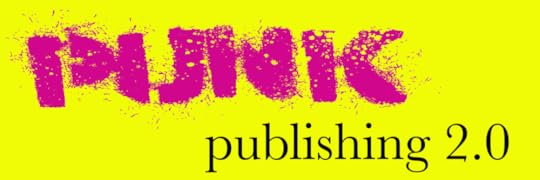
A few years back, as I was getting ready to unleash my first novel on the world all dewy-eyed and full of optimism, I wrote a blog post about self-publishing. If you’re not sure what that is, it’s the revolution in publishing that meant I was about to finally realise my life-long dream of becoming a published author. Now any aspiring author can publish directly through Amazon and other online retailers, selling both ebooks and Print-on-demand paperbacks.
There was, and still is, a stigma to self-publishing – I imagine a few people rolled their eyes just then when I said I was a published author. Did you? If you did, well then ya-boo, sucks to you. But as far as huge swathes of the writing community are concerned, you ain’t published until someone else puts your book into a bookshop.
I say writing community, but it’s wider than that. Tell ordinary people you’ve got a book out, they’ll treat like you like some kind of king. It’s quite lovely, actually. You can’t get them to buy your book, usually, but they’ll be genuinely impressed for a few minutes. But tell them you published it yourself and they’ll do a cocked-head puppy look coupled with an ‘awww’ sound like you’re a toddler who’s announced they can go poop on the potty.
The aim of that blog post was to try to reframe my decision to self-publish, bring it in line with the changes in the music industry. I titled it, somewhat cheekily, Punk Publishing. Now, 3 years later, I thought it would be worth revisiting the topic, to see if it still holds up, in light of the changes in the self-publishing world. I am, after all, quite the indie publishing phenomenon now, after all, having sold, well, some books.
So, does it hold up? Of course it does! If anything, the parallels between the publishing and music industries are only getting stronger, as both head into a tailspin of mutually-assured-self-destruction. Traditionally published authors have two strata: The Beyonce-style pop icons like Stephen King and Lee Child; and the mid-list major label artists who have a decent following but don’t make much from their sales. Except, mid-list trad pub authors can’t go on tour to supplement their income.
Even when it comes to style, you can see both areas overwhelmingly dominated by one genre. Thriller novels are the equivalent of the dance based pop phenomenon you literally cannot escape anymore, which I guess means that James Patterson is… Ed Sheeran? Seriously, go to a supermarket book section and try and buy something that doesn’t have at least one woman being murdered in it. You’re as likely to find anything more exciting than Ed Sheeran’s Divide in the same shop’s vinyl section.
Let’s look at retail, while we’re at it. Sales of both have plateaued after an almighty drop, the loss of which is only partially offset by streaming services. The only real difference between Spotify and Amazon is that Amazon require exclusivity for their streaming service. I’ve written before that this is deeply unhealthy for everyone concerned, just as the low pay-per-stream Spotify pays is inevitably going to come back and bite it in the arse. But detractors of both models miss entirely the same point – that the success of these models is dependent not on the experience of the creators but of the end user.
Which brings me back to the underground. The punks, musically and spiritually. The argument that putting your own work out into the world is lesser than going through gatekeepers is an idea the Buzzcocks blew up musically in the 1970’s, but it’s taken a lot longer in the literary world. But look in weird niches and genres ill-served by the mainstream and you’ll find a now-thriving scene, with a much closer links between authors and audience that’s a lot closer in spirit to underground music. They might not be to everyone’s tastes, but then neither are Converge or Neurosis, and I think they’re both bloody amazing. If you disagree you can come here and fight my beard.
Is there dross in self-publishing? Yes. Of course. But is there dross in trad-publishing? Of course. And one man’s dross is another man’s Da Vinci Code. As indie publishing matures, so too has it followed the model that is helping to preserve the music industry. Authors are using Patreon, selling merch, and hey, is now a good time to mention my Patreon and my merch?
Anyway. The question I posed myself at the start of all this was whether I was right before, and of course I think I was, and maintain that I still am. I am the very definition of resolve and determination. I imagine you’re quite shocked that I’ve come to this conclusion.
If you agree, then you should absolutely support your indie authors. Specifically, this one.
Blood on the Motorway: An apocalyptic trilogy of murder and stale sandwiches is out now in ebook and print from Amazon and all other good bookstores. You can get the first book free by joining my mailing list or read along at Wattpad. Oh, and I’ve got a Patreon. Sign up for free books, a free weekly short story, and much more.
March 5, 2019
Introducing Hollow Stone Press
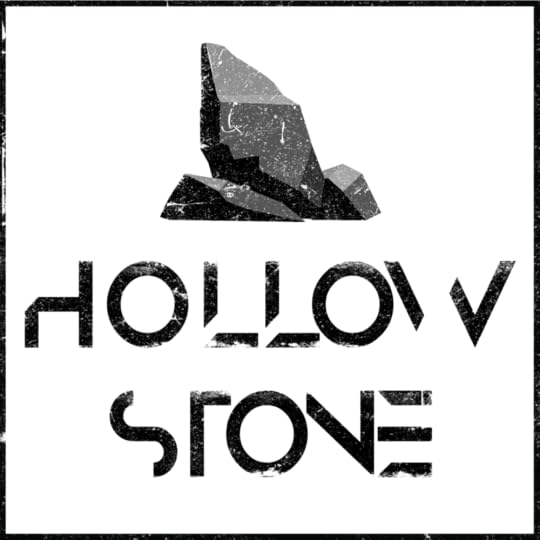
I haven’t had a book out for a while now, and the next one is still a few months away. So, I’ve been spending an inordinate amount of time doing what I like to think of as ‘preparing for success’. Foolhardy, perhaps, especially if that success never comes, but if there’s one thing that my career within the Very Grown Up Big World of Business has taught me, it’s that it’s better to be prepared. I think they were the ones to come up with that phrase, right?
A lot of the writing podcasts I listen to are interview based, little hourly chunks of chat with authors who have somehow stumbled across success in finding and maintaining an audience. I find these chats fascinating, because there’s always one part of the story where the author has to fudge the fact that they really don’t know exactly how this success happened. There’s an ephemeral something else at play that’s out of their hands. Call it luck, call it whatever you want, but they can’t quite place their fingers on it.
In most cases, the next thing they say is that they weren’t prepared for it. One had a bestseller but no mailing list or internet presence, so by the time their next book came out nobody remembered him. One managed to sell thousands of their first book before they’d ad it properly edited, leaving them with hundreds of one-star reviews they found it difficult to shake.
And yet, each of them bounced back, and reached that holy grail – being able to do this nonsense for a living. But what about the other ones, I wonder? The ones who didn’t bounce back, or bounced right off into some cosmic dustbin? I think about the success stories, and I think about the ones I never hear about, and I think a lot about preparing for success. In the event that a massive audience trips over my books and discovers how goshdarned excellent they are, I want to be ready for them.
As part of this, I’ve been thinking about the way I brand my books, and myself. In the extremely long-term, I’d love to try and help other authors, maybe act as a small press organiser. I’ve spent the last few years trying to bring as much of the author process in-house as I can, learning cover design, formatting, advertising, mailing list management, all sorts of things. My wonderful and talented wife is learning to be an editor (she already has a wicked-sharp eye and doesn’t mind telling me if something’s terrible, so it’s only logical), and as a next step, I want to set up my small press.
Yes, it’s early days, but I want to get the name up and running, a few titles under its wings, ready for that success, should it ever come. So, today I’m launching Hollow Stone Press. Ta da!
If you click on the Store link at the top of the page, you’ll be taken to the Hollow Stone webstore, where you can buy e-book versions of all my books, as well as some merchandise. Pretty soon there’ll be the chance to buy signed paperbacks, and I’ll be looking at doing some cool bundles, too. It’s still very early days, but as the Very Grown Up Big World of Business says, always be prepared.
Blood on the Motorway: An apocalyptic trilogy of murder and stale sandwiches is out now in ebook and print from Amazon and all other good bookstores. You can get the first book free by joining my mailing list or read along at Wattpad. Oh, and I’ve got a Patreon. Sign up for free books, a free weekly short story, and much more.



